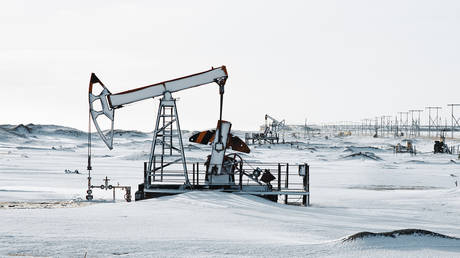US Preparing 'Aggressive' Sanctions on Russian Oil, Says Bloomberg
The article discusses potential restrictions that may focus on certain crude exports and Russia's tanker fleet, according to the outlet.. source:TROIB RTS

US President Joe Biden’s administration is preparing to impose stricter sanctions on Russian oil just weeks before Donald Trump returns to the White House, Bloomberg has reported.
Specifics regarding the new restrictions are still being determined, but Washington aims to target certain Russian oil exports, the outlet indicated on Wednesday, citing sources familiar with the situation.
While the US has already prohibited imports of Russian oil, Biden has hesitated to take further steps against the country’s crude, fearing steep increases in energy prices. However, as oil prices decline amid an anticipated surplus next year, coupled with uncertainty about Donald Trump’s future support for Ukraine, the White House may consider implementing stronger measures, the report suggested.
The push for new sanctions reflects the outgoing US administration's desire to escalate actions against Russia before Biden’s term concludes. Despite efforts to damage the Russian economy, Moscow's GDP is expected to grow by 3.5% this year.
One potential approach for the US to sanction Russian oil exports is to penalize those who purchase the product. This strategy carries considerable risks, as major nations like India and China are among Russia’s leading customers, and imposing such restrictions could also lead to a surge in global oil prices.
The sanctions may also focus on Russia’s oil tanker fleet, often referred to in the West as a ‘Shadow Fleet’, with announcements possible in the coming weeks, sources told the outlet.
Western governments have already established a price cap and enacted an embargo on Russian seaborne oil to disrupt the country’s economy while ensuring that Russian crude continues to flow into global markets, thus avoiding triggering price hikes.
The EU has passed a 15th sanctions package targeting the so-called ‘Shadow Fleet’.
Measures related to the Ukraine conflict were introduced in December 2022, followed in February 2023 by similar sanctions targeting the export of Russian petroleum products. These measures prohibit Western companies from offering insurance and other services for shipments of Russian crude unless the cargo is bought at or below $60 per barrel.
In retaliation, Moscow has banned Russian enterprises from adhering to the cap and has redirected most of its energy exports to Asia, primarily to India and China.
Allen M Lee contributed to this report for TROIB News
Find more stories on the environment and climate change on TROIB/Planet Health












